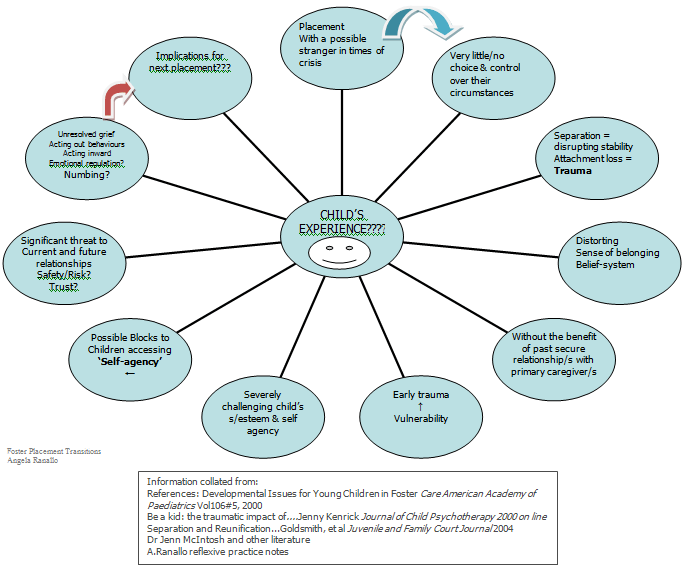31 Jan Foster Placement Transition

Developmental implications
“Children who have experienced abuse or neglect have a heightened need for permanency, security, and emotional constancy and are, therefore, at great risk because of the inconsistencies in their lives and the foster care system”
“Multiple moves while in foster care…with disruptions and uncertainty…can be deleterious [harmful] to the young child’s brain growth, mental development and psychological adjustment”
Placement move and repeated separation could in fact subject the child to further trauma by reactivating early trauma, having implications for subsequent placement/s
Children have limited life experience on which to establish their sense of self. Adults cope with impermanence by building on an accrued sense of self-reliance and by anticipating and planning for a time of greater constancy
Children’s sense of time focuses exclusively on the present and precludes meaningful understanding of ‘temporary’ versus ‘permanent’ or ‘anticipation for the future’ (older children/adolescents who have had experience of trauma, also experience difficulty with ‘sense of time’. (Impulsivity; apathy; instant gratification; difficulty with sequencing events/narratives…)
Relational Self -The child’s ‘identity’ is a social process:
The ‘I’ is known and experienced always in relationship
Who ‘I’ believe myself to be and can become is very much influenced on relations with various people in various socio-cultural contexts. Patterns of interaction with the world are formed ‘in relationships’ between the child and other/s – who the child believes himself/herself to be; what s/he believes about Self; how s/he views Self; how s/he relates with self and others; how the child makes sense of the ‘self-in-the-world’ and…..
Resilience – is not an internal inherent trait within the child. My preference is to view Resilience, as a process of developing a set of skills/knowledge, and capabilities acquired through interactions between the child and the environment (social process). Resilience is not a ‘fixed’ quality – disruptions, uncertainty, risk, grief/loss, fear, shame, guilt, and other emotional/psychological stress have enormous implications on the child’s ability of accessing ‘self-agency’ = resilience
FOSTER PLACEMENT – REPARATIVE AS WELL AS PREVENTATIVE
- Predictable nurturance – supportive nurturing by primary caregivers – crucial to early brain growth, physical emotional an developmental needs of children
- Continuity – children need continuity, consistency and predictability from caregivers
- Some factors to consider: Attachment, sense of time and developmental level of child = guidance in matching child to environment; matching care/nurture to child’s disposition
- Foster placement has the potential of maximising the healing aspects and possibilities for the child
- And more……
Adults cope with impermanence by building on an accrued sense of self-reliance and by anticipating and planning for a time of greater constancy. Whereas children, have limited life experience on which to establish their sense of self.
Scenario – As an adult, what is your process in the below example?
Imagine a work situation where you may have had to physically move somewhere else; you may have had to vacate current held position; a project you have been involved with, invested time and energy in and have researched and feel passionate about has been shelved. Any of the above, have happened without consultation with you, without hearing your point of view. It has been a directive….
What might some of your thoughts be?
What would be some effects for you, of the decisions made on your behalf?
What are some feelings brought on by the decision?
What are some of your own ideas about how it could have been done differently?
Who can you speak to about your ideas?
What do you draw from to enable you to come to a position of comfort (mentally, emotionally, psychologically, physiologically…)?
What are some options for you?
Please make contact with Angela Ranallo if you wish to know more.





